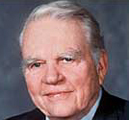
Andy Rooney
http://www.NewsAndOpinion.com -- THE restrictions put on reporters trying to tell the American people what's going on in the war in Afghanistan are wrong and unAmerican.
The American public doesn't even seem to realize it's not getting anything but government-approved information from the front-or from the back, for that matter. No Ernie Pyle is going to emerge from this war because reporters are not being allowed close enough to the action to write about it. We have to depend on the almost-nightly press conference from the bright, engaging, sharp and fork-tongued Donald Rumsfeld for what little he chooses to tell us. Rumsfeld shares the generals' belief that it's easier to fight a war if the people you're fighting it for don't know what you're doing.
(The unkindest cut made last week was when Bill O'Reilly said the Pentagon isn't telling us what it's doing because it doesn't know what it's doing.)
One of President Bush's best moments in his whole presidency came when he stepped in recently to close down the new "disinformation" agency. As part of the war on terrorism, the Office of Strategic Influence was apparently going to spread false information to influence opinion in foreign countries.
President Bush, in indicating he disapproved of the agency, hedged a little when he stated, "We will never misinform the American people." He left the door open for us to lie abroad.
There has always been animosity between journalists and generals. Generals don't like being watched. If they bomb the wrong target or alienate several million people in a foreign country by killing innocent citizens by mistake, they don't want anyone back home to know. They cover their mistakes by not allowing reporters where the action is.
The death of Daniel Pearl, the Wall Street Journal reporter, has helped the military. It reenforces their claim that it's too dangerous to let such fact-finders go forward to where the facts are.
Journalists are no more or less brave or heroic than anyone else. There have always been reporters who risked their lives to get a story up front while other reporters waited behind the lines for a handout from the military. Sometimes the reporters went where it was dangerous, not based on any grand vision of informing the American public but to get a story no one else had. Even if it was glory the reporter was after, the story served the American public better than a Pentagon announcement of what happened .You won't read about any military disasters in the bulletins issued by a U.S Army public relations office.
Our current military leaders in the Pentagon would find the press operation in World War II hard to believe. In June of 1944, days after our invasion of France, I joined the First Army press camp. There were about 25 reporters there.
The motor pool for the press camp had 14 jeeps and one Diamond T truck. We shared the jeeps and as the Army pressed forward across France, our tents were packed into the truck and the press camp was moved up nearer the action.
Every morning, reporters from different news organizations paired up in the jeeps and set out for the front lines. The Time magazine reporter avoided the jeep with Newsweek's man. AP didn't share with UP. CBS didn't go with NBC.
The reporters in search of stories told no one where they were going. They didn't tell the fighting units they were coming. They asked permission of no one. They each went where they thought the story was and talked to the soldiers fighting the war. No one stopped us.
We had two censors, lieutenants, assigned to the camp. Their only job was to delete anything that might reveal troop locations. They were not charged with changing our copy to make it more favorable to Army commanders.
The American public learned first hand, in a day, more about the progress of World War II than it will learn in a year about what we're doing in Afghanistan or anywhere else our military is in control of what the public is told.
That's wrong. It's unAmerican.
Comment on JWR contributor Andy Rooney's column by clicking here.
03/01/02: Some thoughts on aging
02/27/02: Saving is a cheap hobby
